乔布斯英文介绍!!超经典!!
- 格式:doc
- 大小:28.00 KB
- 文档页数:3
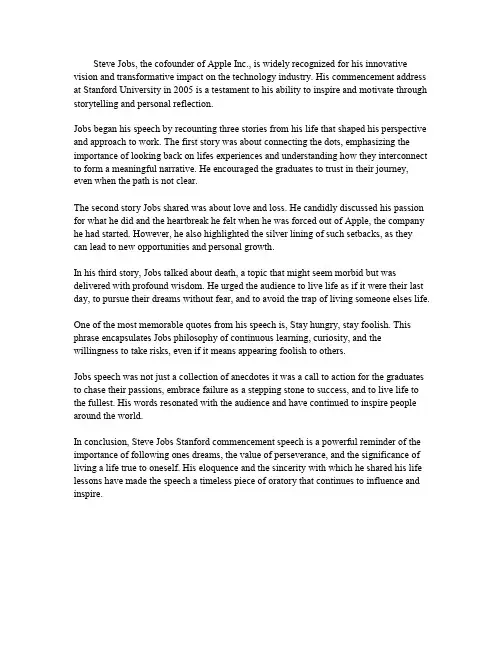
Steve Jobs, the cofounder of Apple Inc., is widely recognized for his innovative vision and transformative impact on the technology industry. His commencement address at Stanford University in 2005 is a testament to his ability to inspire and motivate through storytelling and personal reflection.Jobs began his speech by recounting three stories from his life that shaped his perspective and approach to work. The first story was about connecting the dots, emphasizing the importance of looking back on lifes experiences and understanding how they interconnect to form a meaningful narrative. He encouraged the graduates to trust in their journey, even when the path is not clear.The second story Jobs shared was about love and loss. He candidly discussed his passion for what he did and the heartbreak he felt when he was forced out of Apple, the company he had started. However, he also highlighted the silver lining of such setbacks, as they can lead to new opportunities and personal growth.In his third story, Jobs talked about death, a topic that might seem morbid but was delivered with profound wisdom. He urged the audience to live life as if it were their last day, to pursue their dreams without fear, and to avoid the trap of living someone elses life.One of the most memorable quotes from his speech is, Stay hungry, stay foolish. This phrase encapsulates Jobs philosophy of continuous learning, curiosity, and the willingness to take risks, even if it means appearing foolish to others.Jobs speech was not just a collection of anecdotes it was a call to action for the graduates to chase their passions, embrace failure as a stepping stone to success, and to live life to the fullest. His words resonated with the audience and have continued to inspire people around the world.In conclusion, Steve Jobs Stanford commencement speech is a powerful reminder of the importance of following ones dreams, the value of perseverance, and the significance of living a life true to oneself. His eloquence and the sincerity with which he shared his life lessons have made the speech a timeless piece of oratory that continues to influence and inspire.。
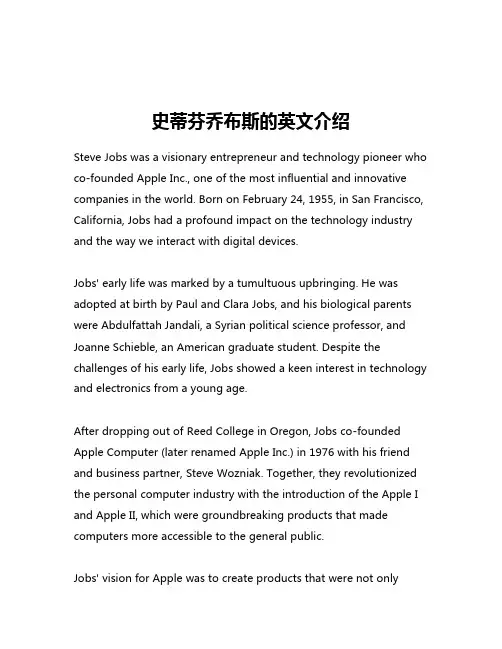
史蒂芬乔布斯的英文介绍Steve Jobs was a visionary entrepreneur and technology pioneer who co-founded Apple Inc., one of the most influential and innovative companies in the world. Born on February 24, 1955, in San Francisco, California, Jobs had a profound impact on the technology industry and the way we interact with digital devices.Jobs' early life was marked by a tumultuous upbringing. He was adopted at birth by Paul and Clara Jobs, and his biological parents were Abdulfattah Jandali, a Syrian political science professor, and Joanne Schieble, an American graduate student. Despite the challenges of his early life, Jobs showed a keen interest in technology and electronics from a young age.After dropping out of Reed College in Oregon, Jobs co-founded Apple Computer (later renamed Apple Inc.) in 1976 with his friend and business partner, Steve Wozniak. Together, they revolutionized the personal computer industry with the introduction of the Apple I and Apple II, which were groundbreaking products that made computers more accessible to the general public.Jobs' vision for Apple was to create products that were not onlytechnologically advanced but also beautifully designed and user-friendly. He believed that technology should be seamlessly integrated into people's lives, making it easier and more enjoyable to interact with digital devices. This philosophy was evident in the design and development of Apple's iconic products, including the Macintosh, the iMac, the iPod, the iPhone, and the iPad.One of Jobs' most significant achievements was the development of the iPhone, which was released in 2007. The iPhone revolutionized the smartphone industry and changed the way people interacted with their mobile devices. With its sleek design, intuitive touch-screen interface, and powerful features, the iPhone quickly became a global phenomenon, and it remains one of the most popular and influential products in the technology industry.In addition to his work at Apple, Jobs was also involved in other technology-related ventures, including the founding of Pixar Animation Studios, which produced some of the most beloved animated films of all time, such as Toy Story, Finding Nemo, and The Incredibles. Jobs' leadership and creative vision were instrumental in Pixar's success, and he played a key role in shaping the company's artistic and technological direction.Despite his many successes, Jobs' life was not without its challenges. In 2003, he was diagnosed with a rare form of pancreatic cancer,which he fought with characteristic determination and resilience. Although he took a leave of absence from Apple to undergo treatment, he ultimately returned to the company and continued to lead it to new heights.Jobs' legacy extends far beyond his achievements in the technology industry. He was also a passionate advocate for design, education, and environmental sustainability, and he used his platform to promote these causes. He was known for his charismatic and inspiring public speaking, and his keynote addresses at Apple events were eagerly anticipated by tech enthusiasts and the general public alike.Sadly, Jobs passed away on October 5, 2011, at the age of 56, after a long battle with cancer. His death was a profound loss for the technology community and the world at large, but his legacy continues to inspire and influence people around the globe.In the years since his passing, Jobs' impact on the technology industry and the world has only grown. Apple has continued to innovate and push the boundaries of what is possible with digital devices, and Jobs' vision and principles remain at the core of the company's identity. Moreover, his influence can be seen in the work of countless entrepreneurs, designers, and innovators who have been inspired by his relentless pursuit of perfection and hisunwavering commitment to creating products that enhance and enrich people's lives.In conclusion, Steve Jobs was a true visionary and a transformative figure in the technology industry. His passion, creativity, and dedication to excellence have left an indelible mark on the world, and his legacy will continue to inspire and shape the future of technology for generations to come.。
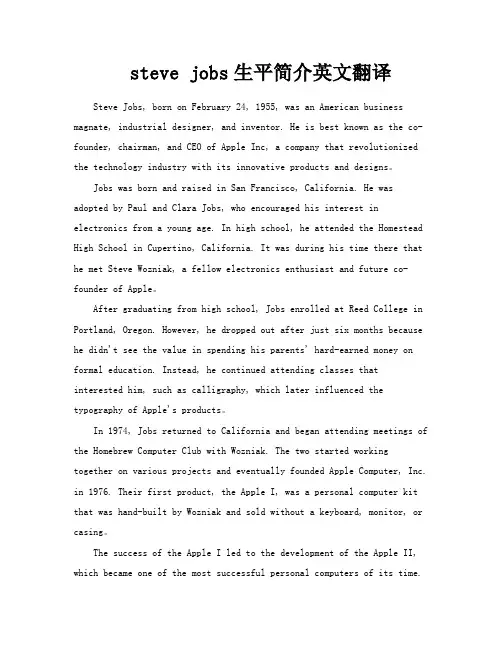
steve jobs生平简介英文翻译Steve Jobs, born on February 24, 1955, was an American business magnate, industrial designer, and inventor. He is best known as the co-founder, chairman, and CEO of Apple Inc, a company that revolutionized the technology industry with its innovative products and designs。
Jobs was born and raised in San Francisco, California. He was adopted by Paul and Clara Jobs, who encouraged his interest in electronics from a young age. In high school, he attended the Homestead High School in Cupertino, California. It was during his time there that he met Steve Wozniak, a fellow electronics enthusiast and future co-founder of Apple。
After graduating from high school, Jobs enrolled at Reed College in Portland, Oregon. However, he dropped out after just six months because he didn't see the value in spending his parents' hard-earned money on formal education. Instead, he continued attending classes thatinterested him, such as calligraphy, which later influenced the typography of Apple's products。
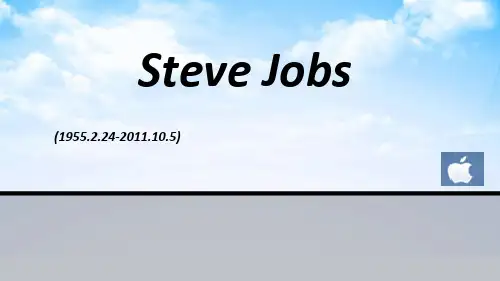
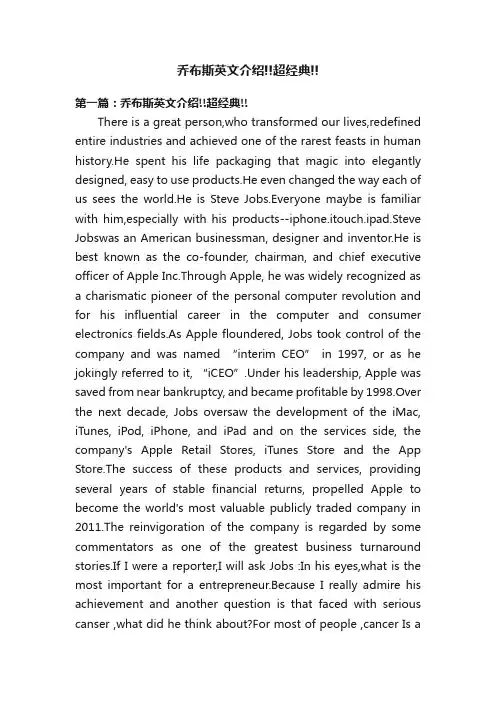
乔布斯英文介绍!!超经典!!第一篇:乔布斯英文介绍!!超经典!!There is a great person,who transformed our lives,redefined entire industries and achieved one of the rarest feasts in human history.He spent his life packaging that magic into elegantly designed, easy to use products.He even changed the way each of us sees the world.He is Steve Jobs.Everyone maybe is familiar with him,especially with his products--iphone.itouch.ipad.Steve Jobswas an American businessman, designer and inventor.He is best known as the co-founder, chairman, and chief executive officer of Apple Inc.Through Apple, he was widely recognized as a charismatic pioneer of the personal computer revolution and for his influential career in the computer and consumer electronics fields.As Apple floundered, Jobs took control of the company and was named “interim CEO” in 1997, or as he jokingly referred to it, “iCEO”.Under his leadership, Apple was saved from near bankruptcy, and became profitable by 1998.Over the next decade, Jobs oversaw the development of the iMac, iTunes, iPod, iPhone, and iPad and on the services side, the company's Apple Retail Stores, iTunes Store and the App Store.The success of these products and services, providing several years of stable financial returns, propelled Apple to become the world's most valuable publicly traded company in 2011.The reinvigoration of the company is regarded by some commentators as one of the greatest business turnaround stories.If I were a reporter,I will ask Jobs :In his eyes,what is the most important for a entrepreneur.Because I really admire his achievement and another question is that faced with serious canser ,what did he think about?For most of people ,cancer Is aacute attack to one’s mental and heart ,but Jobs lead Apple to the climax.The reason that I want to introduce Steve Jobs is not only because the enormous acomplish,but also because his great personality.The Economisist says:” NOBODY else in the computer industry could put on a show like Steve Jobs.His product launches, at which he would stand alone on a black stage and conjure up a “magical” or “incredible” new electronic gadget in front of an awed crowd, were the performances of a master showman.All computers do is to do something about c auculation, but do it fast enough and “the results appear to be magic”, he once explained.He spent his life packaging that magic into elegantly designed, easy to useproducts.”In retrospect, Mr Jobs was a man ahead of his time during his first stint at Ap puting’s early years were dominated by technical types.But his emphasis on design and ease of use gave him the edge later on.Elegance, simplicity and an understanding of other fields came to matter in a world in which computers are fashion items, carried by everyone, that can do almost anything.“Technology alone is not enough,” said Mr Jobs at the end of his speech introducing the iPad, in January 2010.“It’s technology married with liberal arts, married with humanities, that yields the results that m ake our hearts sing.” It was an unusual statement for the head of a technology firm, but it was vintage Steve Jobs.He attributed his success to an obsessive attention to detail , his pursuit of perfection and his flair for innovation.He said-“I want to mak e icons do look lick with his tongue”;To be able to sleep at night, to the aesthetic and quality throughout the pursuit of excellence“"Do not let the noise of others opinions drown your inner voice, heart andintuition to have the courage to listen to the call.”-He is Apple's “The Godfather” Jobs.“A pirate, a paranoid, a perfect combination of art and technology of IT leaders, a person who changed the world.” He said in his youth that he wanted to “put a ding in the universe” did just that.到目前为止,世界上还没有哪个计算机行业或者其他任何行业的领袖能够像乔布斯那样举办出一场万众瞩目的盛会。
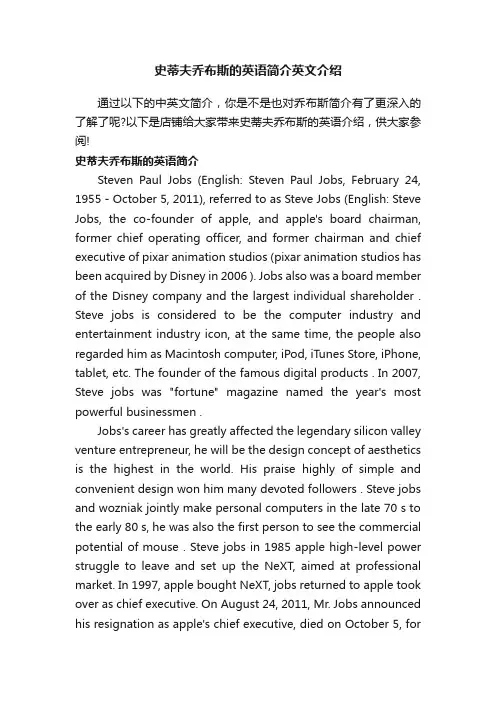
史蒂夫乔布斯的英语简介英文介绍通过以下的中英文简介,你是不是也对乔布斯简介有了更深入的了解了呢?以下是店铺给大家带来史蒂夫乔布斯的英语介绍,供大家参阅!史蒂夫乔布斯的英语简介Steven Paul Jobs (English: Steven Paul Jobs, February 24, 1955 - October 5, 2011), referred to as Steve Jobs (English: Steve Jobs, the co-founder of apple, and apple's board chairman, former chief operating officer, and former chairman and chief executive of pixar animation studios (pixar animation studios has been acquired by Disney in 2006 ). Jobs also was a board member of the Disney company and the largest individual shareholder . Steve jobs is considered to be the computer industry and entertainment industry icon, at the same time, the people also regarded him as Macintosh computer, iPod, iTunes Store, iPhone, tablet, etc. The founder of the famous digital products . In 2007, Steve jobs was "fortune" magazine named the year's most powerful businessmen .Jobs's career has greatly affected the legendary silicon valley venture entrepreneur, he will be the design concept of aesthetics is the highest in the world. His praise highly of simple and convenient design won him many devoted followers . Steve jobs and wozniak jointly make personal computers in the late 70 s to the early 80 s, he was also the first person to see the commercial potential of mouse . Steve jobs in 1985 apple high-level power struggle to leave and set up the NeXT, aimed at professional market. In 1997, apple bought NeXT, jobs returned to apple took over as chief executive. On August 24, 2011, Mr. Jobs announced his resignation as apple's chief executive, died on October 5, forwith pancreatic cancer , 56 years old have to .史蒂夫乔布斯的中英文简介Steven Paul "Steve" Jobs (February 24, 1955 –October 5, 2011) was an American businessman, designer and inventor. He is best known as the co-founder, chairman, and chief executive officer of Apple Inc. Through Apple, he was widely recognized as a charismatic pioneer of the personal computer revolution and for his influential career in the computer and consumer electronics fields.史蒂芬•保罗•乔布斯,通称史蒂夫•乔布斯,(1955年2月24日-2011年10月5日),是美国商业巨子,设计家和发明家。
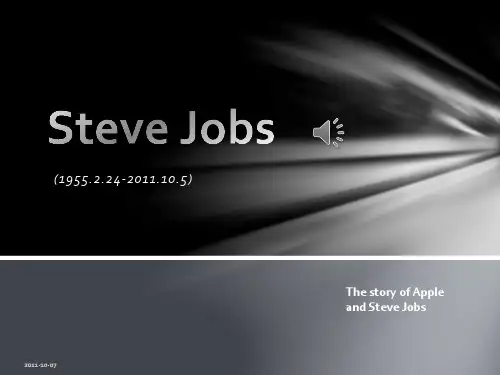
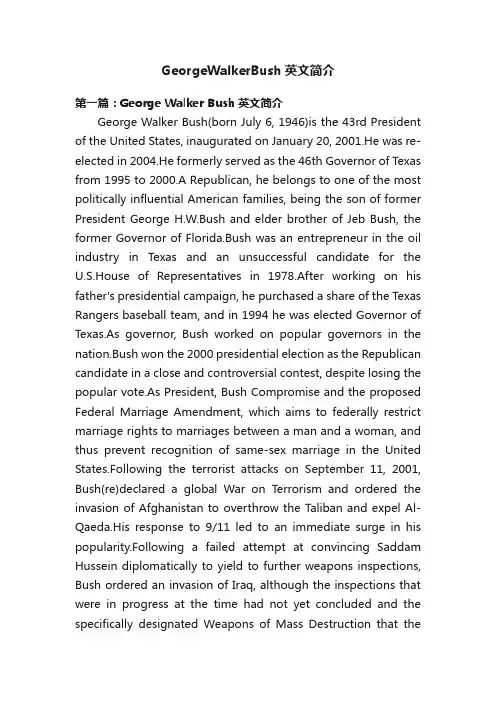
GeorgeWalkerBush英文简介第一篇:George Walker Bush英文简介George Walker Bush(born July 6, 1946)is the 43rd President of the United States, inaugurated on January 20, 2001.He was re-elected in 2004.He formerly served as the 46th Governor of Texas from 1995 to 2000.A Republican, he belongs to one of the most politically influential American families, being the son of former President George H.W.Bush and elder brother of Jeb Bush, the former Governor of Florida.Bush was an entrepreneur in the oil industry in Texas and an unsuccessful candidate for the U.S.House of Representatives in 1978.After working on his father's presidential campaign, he purchased a share of the Texas Rangers baseball team, and in 1994 he was elected Governor of Texas.As governor, Bush worked on popular governors in the nation.Bush won the 2000 presidential election as the Republican candidate in a close and controversial contest, despite losing the popular vote.As President, Bush Compromise and the proposed Federal Marriage Amendment, which aims to federally restrict marriage rights to marriages between a man and a woman, and thus prevent recognition of same-sex marriage in the United States.Following the terrorist attacks on September 11, 2001, Bush(re)declared a global War on Terrorism and ordered the invasion of Afghanistan to overthrow the Taliban and expel Al-Qaeda.His response to 9/11 led to an immediate surge in his popularity.Following a failed attempt at convincing Saddam Hussein diplomatically to yield to further weapons inspections, Bush ordered an invasion of Iraq, although the inspections that were in progress at the time had not yet concluded and the specifically designated Weapons of Mass Destruction that theCoalition of the Willing invaded to capture have never been found.Following the overthrow of Hussein's regime, Bush committed the U.S.to establishing democracy in the Middle East, and specifically in both Afghanistan and Iraq in the short term.A self-described “war President”, Bush won re-election in 2004 after an intense and heated election campaign, becoming the first candidate to win a majority vote in 16 years, as well as the largest tally of votes for any presidential candidate.Since re-election in 2004, Bush has received increasingly heated criticisms for his management of the war, as well as domestic issues, which have caused his popularity to decline.President Bush is married to Laura Welch Bush,a former teacher and librarian, and they havetwin daughters, Barbara and Jenna.The Bushfamily also includes two dogs, Barney andMiss Beazley, and a cat, Willie.“I feel like God wants me to run for president.I can't explain it, but I sense my country is going to need me.Something is going to happen and, at that time, my country is going to need me.I know it won't be easy on me or my family, but God wants me to do it.”So said then-Governor George W.Bush to a few trusted friends about the 2000 presidential race.As president, Bush has continued to bring his deep religious belief to his job-a fact that has delighted the nation's conservative Christians and distressed many others.That Bush has appointed likeminded Christians to high posts-including Secretary of State John Ashcroft, who was once quoted as saying that the controversy.So have Bush's support and funding of faith-based initiatives.And with his administration swearing to keep the words in the Pledge of Allegiance, a matter which the Supreme Court will take underconsideration this, many are left wondering: Whatever happened to the separation between church and state?But Bush's faith is an asset to his presidency and not a weakness, argues Stephen Mansfield in his provocative new book, The Faith of George Bush.In this spiritual biography of the president, Mansfield shows that Bush uses his faith to help him be a better leader(and man and husband and parent)without allowing it to dictate policy decisions.Said his close friend, Commerce Secretary Don Evans: “It gives him a desire to serve others and a very clear sense of what is good and what • Bush's tongue started slipping almost as soon as he started talking at a business forum on • ”Mr.Prime Minister, thank you for your introduction,“ he told Prime Minister John Howard.”Thank you for being such a fine host for the OPEC summit.“• As the audience of several hundred people erupted in laughter, Bush corrected himselfand joked, ”He invited me to the OPEC summit next year.“ Australia has never been a member of the Organization of the Petroleum Exporting Countries.•Later in his speech, Bush recounted how Howard had gone to visit ”Austrian troops“ last year in Iraq.There are, in fact, no Austrian troops there.But Australia has about 1,500 Australian military personnel in and around the country. Grammar Errors• “There…s too many issues left unresolved.”(is →are)• “Will the highways on the Internet become more few?”(more few→fewer)• ”We look forward to hearing your vision, so we can more better do our job.“(more better→better)• “You teach a child to read, and he or her will be able to pass a literacy test.”(he or her →he or she)Vocabulary errors• “Keep good relations with the Grecians“(Greek→ Grecians)• “If the tarriers and bariffs are torn down, this economy will grow.”(barriers and tariffs→tarriers and bar iffs)• “They misunderestimated me.”(underestimated→ misunderestimated• I'm really looking forward to watching the American Olympic team compete, particularlywith the mighty Chinese team.”• Millions of Americans and Chinese must be saying that, and hoping to get a ticket forwhat has been billed as the clash of titans.• But those words were spoken by none other than US President George W.Bush.• At his meeting with President Hu Jintao on the sidelines of the G8 Summit yesterday,Bush asked, in a lighter vein, whether he could get tickets to the US-China basketball game at the Beijing Olympics.The president has been hyperactively engaged in seeking to solve several of the world's most pressing problems.Among the more dramatic examples: his installation of a new sprinkler systemfor watering the lawn;erecting a gate at the end of the driveway and cutting new bike trails across the ranch.Life sure is busy for the 43rd president of the US.While the world appears to be collapsing around his head – in no small part thanks to the legacy he bequeathed his successor Barack Obama –he isintensely focused on rebuilding his own private universe.Top of the list of George Bush's priorities these past 100 days has been what he calls “replenishing the ol' coffers”.Which tra nslates into plain Texan as making cash.It may be hard to imagine why anyone would want to pay $400(about £270)a ticket to hear the former incumbent of the White House explain how he came to make his most important executive decisions.Perhaps they are keen to learn how not to make important executive decisions –along the lines of the motivational speaker, but in reverse.第二篇:英文简介我叫李永亮。
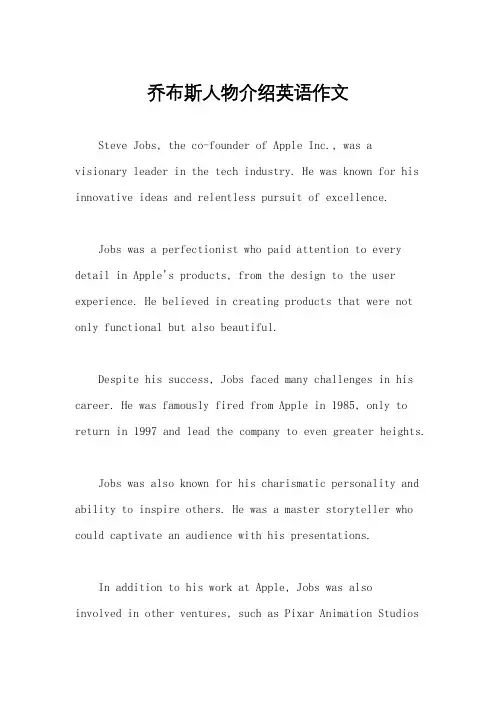
乔布斯人物介绍英语作文Steve Jobs, the co-founder of Apple Inc., was avisionary leader in the tech industry. He was known for his innovative ideas and relentless pursuit of excellence.Jobs was a perfectionist who paid attention to every detail in Apple's products, from the design to the user experience. He believed in creating products that were not only functional but also beautiful.Despite his success, Jobs faced many challenges in his career. He was famously fired from Apple in 1985, only to return in 1997 and lead the company to even greater heights.Jobs was also known for his charismatic personality and ability to inspire others. He was a master storyteller who could captivate an audience with his presentations.In addition to his work at Apple, Jobs was alsoinvolved in other ventures, such as Pixar Animation Studiosand NeXT Inc. He had a diverse range of interests and was always looking for new opportunities to innovate.Overall, Steve Jobs was a true pioneer in the tech industry, leaving behind a lasting legacy that continues to inspire entrepreneurs and innovators around the world.。
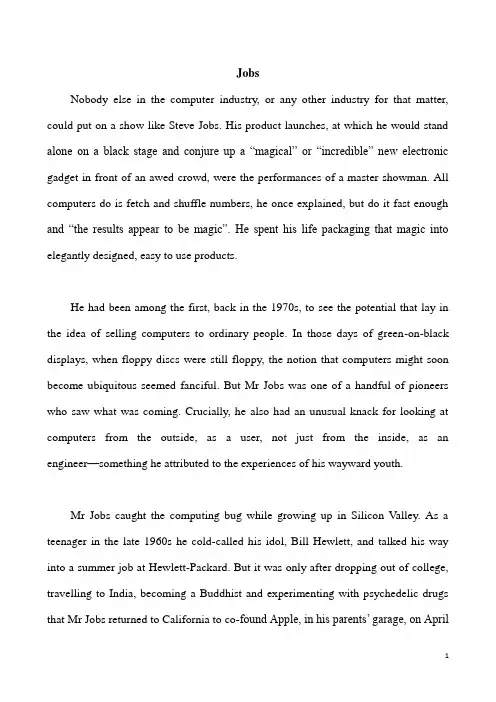
JobsNobody else in the computer industry, or any other industry for that matter, could put on a show like Steve Jobs. His product launches, at which he would stand alone on a black stage and conjure up a “magical” or “incredible” new electronic gadget in front of an awed crowd, were the performances of a master showman. All computers do is fetch and shuffle numbers, he once explained, but do it fast enough and “the results appear to be magic”. He spent his life packaging that magic into elegantly designed, easy to use products.He had been among the first, back in the 1970s, to see the potential that lay in the idea of selling computers to ordinary people. In those days of green-on-black displays, when floppy discs were still floppy, the notion that computers might soon become ubiquitous seemed fanciful. But Mr Jobs was one of a handful of pioneers who saw what was coming. Crucially, he also had an unusual knack for looking at computers from the outside, as a user, not just from the inside, as an engineer—something he attributed to the experiences of his wayward youth.Mr Jobs caught the computing bug while growing up in Silicon Valley. As a teenager in the late 1960s he cold-called his idol, Bill Hewlett, and talked his way into a summer job at Hewlett-Packard. But it was only after dropping out of college, travelling to India, becoming a Buddhist and experimenting with psychedelic drugs that Mr Jobs returned to California to co-found Apple, in his parents’ garage, on AprilFools’ Day 1976. “A lot of people in our industry haven’t had very diverse experiences,” he once said. “So they don’t have enough dots to connect, and they end up with very linear solutions.” Bill Gates, he suggested, would be “a broader guy if he had dropped acid once or gone off to an ashram when he was younger”.Dropping out of his college course and attending calligraphy classes instead had, for example, given Mr Jobs an apparently useless love of typography. But support for a variety of fonts was to prove a key feature of the Macintosh, the pioneering mouse-driven, graphical computer that Apple launched in 1984. With its windows, icons and menus, it was sold as “the computer for the rest of us”. Having made a fortune from Apple’s initial success, Mr Jobs expected to sell “zillions” of his new machines. But the Mac was not the mass-market success Mr Jobs had hoped for, and he was ousted from Apple by its board.Yet this apparently disastrous turn of events turned out to be a blessing: “the best thing that could have ever happened to me”, Mr Jobs later called it. He co-founded a new firm, Pixar, which specialised in computer graphics, and NeXT, another computer-maker. His remarkable second act began in 1996 when Apple, having lost its way, acquired NeXT, and Mr Jobs returned to put its technology at the heart of a new range of Apple products. And the rest is history: Apple launched the iMac, the iPod, the iPhone and the iPad, and (briefly) became the world’s most valuable listed company. “I’m pretty sure none of this would have happened if Ihadn’t been fired from Apple,” Mr Jobs said in 2005. When his failing health forced him to step down as Apple’s boss in 2011, he was hailed as the greatest chief executive in history. Oh, and Pixar, his side project, produced a string of hugely successful animated movies.In retrospect, Mr Jobs was a man ahead of his time during his first stint at Apple. Computing’s early years were dominated by technical types. But his emphasis on design and ease of use gave him the edge later on. Elegance, simplicity and an understanding of other fields came to matter in a world in which computers are fashion items, carried by everyone, tha t can do almost anything. “Technology alone is not enough,” said Mr Jobs at the end of his speech introducing the iPad, in January 2010. “It’s technology married with liberal arts, married with humanities, that yields the results that make our hearts sing.” It was an unusual statement for the head of a technology firm, but it was vintage Steve Jobs.His interdisciplinary approach was backed up by an obsessive attention to detail.A carpenter making a fine chest of drawers will not use plywood on the back, even though nobody will see it, he said, and he applied the same approach to his products. “For you to sleep well at night, the aesthetic, the quality, has to be carried all the way through.” He insisted that the first Macintosh should have no internal c ooling fan, so that it would be silent—putting user needs above engineering convenience. He called an Apple engineer one weekend with an urgent request: the colour of one letterof an on-screen logo on the iPhone was not quite the right shade of yellow. He often wrote or rewrote the text of Apple’s advertisements himself.His on-stage persona as a Zen-like mystic notwithstanding, Mr Jobs was an autocratic manager with a fierce temper. But his egomania was largely justified. He eschewed market researchers and focus groups, preferring to trust his own instincts when evaluat ing potential new products. “A lot of times, people don’t know what they want until you show it to them,” he said. His judgment proved uncannily accurate: by the end of his career the hits far outweighed the misses. Mr Jobs was said by an engineer in the early years of Apple to emit a “reality distortion field”, such were his powers of persuasion. But in the end he changed reality, channelling the magic of computing into products that reshaped music, telecoms and media. The man who said in his youth that he wanted to “put a ding in the universe” did just that.以下为中文评论全文:到目前为止,世界上还没有哪个计算机行业或者其他任何行业的领袖能够像乔布斯那样举办出一场万众瞩目的盛会。
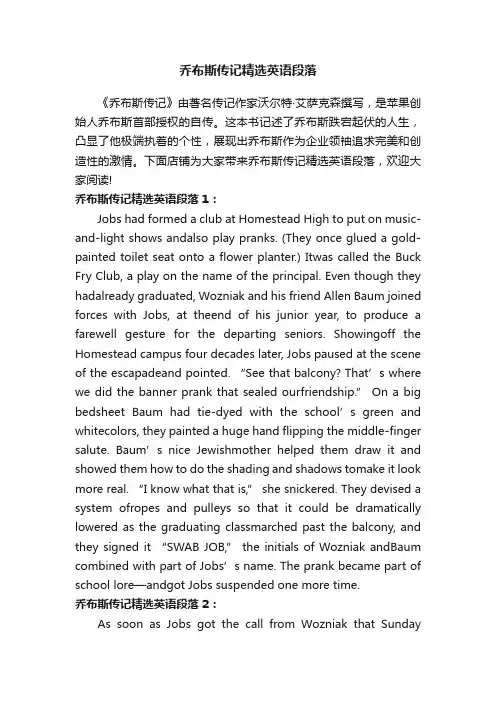
乔布斯传记精选英语段落《乔布斯传记》由著名传记作家沃尔特·艾萨克森撰写,是苹果创始人乔布斯首部授权的自传。
这本书记述了乔布斯跌宕起伏的人生,凸显了他极端执着的个性,展现出乔布斯作为企业领袖追求完美和创造性的激情。
下面店铺为大家带来乔布斯传记精选英语段落,欢迎大家阅读!乔布斯传记精选英语段落1:Jobs had formed a club at Homestead High to put on music-and-light shows andalso play pranks. (They once glued a gold-painted toilet seat onto a flower planter.) Itwas called the Buck Fry Club, a play on the name of the principal. Even though they hadalready graduated, Wozniak and his friend Allen Baum joined forces with Jobs, at theend of his junior year, to produce a farewell gesture for the departing seniors. Showingoff the Homestead campus four decades later, Jobs paused at the scene of the escapadeand pointed. “See that balcony? That’s where we did the banner prank that sealed ourfriendship.” On a big bedsheet Baum had tie-dyed with the school’s green and whitecolors, they painted a huge hand flipping the middle-finger salute. Baum’s nice Jewishmother helped them draw it and showed them how to do the shading and shadows tomake it look more real. “I know what that is,” she snickered. They devised a system ofropes and pulleys so that it could be dramatically lowered as the graduating classmarched past the balcony, and they signed it “SWAB JOB,” the initials of Wozniak andBaum combined with part of Jobs’s name. The prank became part of school lore—andgot Jobs suspended one more time.乔布斯传记精选英语段落2:As soon as Jobs got the call from Wozniak that Sundayafternoon, he knew theywould have to get their hands on the technical journal right away. “Woz picked me upa few minutes later, and we went to the library at SLAC [the Stanford Linear AcceleratorCenter] to see if we could find it,” Jobs recounted. It was Sunday and the library wasclosed, but they knew how to get in through a door that was rarely locked. “Iremember that we were furiously digging through the stacks, and it was Woz who finallyfound the journal with all the frequencies. It was like, holy shit, and we opened it andthere it was. We kept saying to ourselves, ‘It’s real. Holy shit, it’s real.’ It was all laidout—the tones, the frequencies.”乔布斯传记精选英语段落3:Jobs’s craziness was of the cultivated sort. He had begun his lifelong experimentswith compulsive diets, eating only fruits and vegetables, so he was as lean and tight as awhippet. He learned to stare at people without blinking, and he perfected long silencespunctuated by staccato bursts of fast talking. This odd mix of intensity and aloofness,combined with his shoulder-length hair and scraggly beard, gave him the aura of acrazed shaman. He oscillated between charismatic and creepy. “He shuffled around andlooked half-mad,” recalled Brennan. “He had a lot of angst. It was like a big darknessaround him.”乔布斯传记精选英语段落4:Seventeen years earlier, J obs’s parents had made a pledge when they adoptedhim: He would go to college. So they had worked hard and saved dutifully for hiscollege fund, which was modest but adequate by the time he graduated. But Jobs,becoming ever more willful, did not make it easy. At first he toyed with not going tocollege at all. “I think I might have headed to New York if I didn’t go to college,” herecalled,musing on how different his world—and perhaps all of ours—might have beenif he had chosen that path. When his parents pushed him to go to college, he respondedin a passive-aggressive way. He did not consider state schools, such as Berkeley, whereWoz then was, despite the fact that they were more affordable. Nor did he look atStanford, just up the road and likely to offer a sc holarship. “The kids who went toStanford, they already knew what they wanted to do,” he said. “They weren’t reallyartistic. I wanted something that was more artistic and interesting.”乔布斯传记精选英语段落5:In February 1974, after eighteen months of hanging around Reed, Jobs decided tomove back to his parents’ home in Los Altos and look for a job. It was not a difficultsearch. At peak times during the 1970s, the classified section of the San Jose Mercurycarried up to sixty pages of technology help-wanted ads. One of those caught Jobs’seye. “Have fun, make money,” it said. That day Jobs walked into the lobby of the videogame manufacturer Atari and told the personnel director, who was startled by hisunkempt hair and attire, that he wouldn’t leave until they gave him a job.。
乔布斯英文简介1. IntroductionSteve Jobs, born on February 24, 1955, was an American business magnate, industrial designer, and inventor. He co-founded Apple Inc., one of the world’s most valuable companies in terms of market capitalization. Jobs played a significant role in revolutionizing the computer, music, and smartphone industries with his visionary leadership and innovative products. This article provides a brief overview of Steve Jobs’ life and his contributions to the technology world.2. Early Life and EducationSteven Paul Jobs was born to Joanne Schieble and Abdulfattah Jandali in San Francisco, California. Shortly after his birth, he was adopted by Paul and Clara Jobs. Growing up in Mountain View, California, Jobs developed an early interest in electronics and technology. He attended Homestead High School and later enrolled in Reed College but dropped out after six months.3. Apple Inc. and Early SuccessIn 1976, Jobs co-founded Apple Computer Inc. with Steve Wozniak and Ronald Wayne. The company gained early success with the Apple II, a personal computer that became popular among computer enthusiasts and different industries. Despite internal conflicts, Apple continued to innovate and introduced the Macintosh in 1984, featuring a graphical user interface and a mouse. However, due to differences with the company’s board, Jobs left Apple in 1985.4. NeXT Inc. and PixarAfter leaving Apple, Jobs founded NeXT Inc., a computer platform development company. NeXT focused on creating high-quality workstations for the education and bus iness sectors. Although NeXT hardware didn’t achieve widespread success, the company’s operating system became widely influential and eventually formed the foundation for Mac OS X.During his time at NeXT, Jobs also acquired Pixar Animation Studios from Lucasfilm Ltd. Under his leadership as CEO, Pixar became a major player in the animation industry and produced several critically acclaimed movies, including Toy Story, Finding Nemo, and The Incredibles. In 2006, The Walt Disney Company acquired Pixar, makin g Jobs Disney’s largest individual shareholder.5. Return to Apple and Later YearsIn 1996, Apple acquired NeXT Inc., bringing Jobs back to the company he co-founded. Initially, he served as an advisor but soon became interim CEO. Under his guidance, Apple experienced a remarkable turnaround with the introduction of iconic products like the iMac, iPod, iPhone, and iPad. These products revolutionized their respective industries and propelled Apple to become the most valuable company in the world.Despite facing health issues, Jobs continued to lead Apple until his resignation in August 2011. He passed away on October 5, 2011, leaving behind a legacy of innovation and creativity that continues to inspire generations of entrepreneurs and technology enthusiasts.6. ConclusionSteve Jobs’ contributions to the technology industry were nothing short of revolutionary. Through his visionary leadership and relentless pursuit of excellence, he transformed Apple Inc. into a global powerhouse and shaped the way we communi cate, listen to music, and interact with technology. Jobs’ unwavering commitment to innovation and his ability to create products that blended art and technology have cemented his place as one of the greatest entrepreneurs and inventors of our time.。
介绍乔布斯成功英语作文Steve Jobs: A Visionary Whose Legacy Continues to InspireSteve Jobs, the co-founder of Apple Inc., was a true visionary who revolutionized the technology industry and left an indelible mark on the world. His relentless pursuit of perfection, innovative mindset, and unwavering determination have made him a legendary figure, inspiring countless individuals to push the boundaries of what is possible.Born in 1955 in San Francisco, California, Jobs' early life was marked by a deep fascination with technology and a natural aptitude for problem-solving. As a young man, he co-founded Apple with his friend Steve Wozniak, and together they set out to create a personal computer that would be accessible to the masses. This vision would ultimately transform the way the world interacts with technology, and Jobs' influence would extend far beyond the realm of computers.One of the hallmarks of Jobs' success was his ability to anticipate and meet the needs of consumers before they even knew they existed. He had an uncanny knack for identifying emerging trends and designing products that not only addressed those needs but alsocaptured the public's imagination. From the groundbreaking Macintosh to the revolutionary iPhone, Jobs' products were not merely functional; they were works of art that seamlessly blended form and function.Jobs' relentless pursuit of perfection was another key factor in his success. He was known for his meticulous attention to detail, demanding the highest standards from his team and pushing them to constantly improve their work. This drive for excellence was evident in every aspect of Apple's products, from the sleek design to the intuitive user experience. Jobs' insistence on perfection often led to intense debates and clashes with his colleagues, but it also resulted in the creation of some of the most iconic and influential products in the history of technology.Another crucial aspect of Jobs' success was his ability to communicate his vision and inspire others. He was a charismatic and captivating speaker, able to captivate audiences with his passion for technology and his unwavering belief in the power of innovation. Jobs' keynote presentations at Apple events were highly anticipated events, where he would unveil the company's latest creations and share his vision for the future. His ability to connect with his audience and make them feel as though they were part of something larger than themselves was a testament to his leadership skills and his ability to inspire.Despite his many successes, Jobs' life was not without its challenges. He was famously ousted from Apple in the mid-1980s, a move that he later described as one of the most devastating experiences of his life. However, rather than retreating into obscurity, Jobs used this setback as an opportunity to reinvent himself and pursue new ventures. He founded NeXT, a computer company that would later be acquired by Apple, and he also acquired Pixar, the animation studio that would go on to produce some of the most beloved and successful animated films of all time.When Jobs returned to Apple in the late 1990s, he brought with him a renewed sense of purpose and a determination to restore the company to its former glory. He oversaw the development of the iMac, the iPod, the iPhone, and the iPad, each of which would go on to revolutionize their respective industries and cement Apple's status as one of the most innovative and successful technology companies in the world.Throughout his career, Jobs remained committed to his vision of creating products that would improve people's lives. He believed that technology should be more than just a tool; it should be a means of self-expression and a way to connect with others. This philosophy was reflected in the design and functionality of Apple's products, which were renowned for their elegance, simplicity, anduser-friendliness.Even after his untimely death in 2011, Jobs' legacy continues to inspire and influence the technology industry and the world at large. His relentless pursuit of perfection, his commitment to innovation, and his ability to connect with his audience have become the stuff of legend, and his influence can be seen in the work of countless entrepreneurs, designers, and innovators who have been inspired by his vision.In conclusion, Steve Jobs was a true visionary whose impact on the world of technology and beyond cannot be overstated. His unwavering dedication to creating products that would improve people's lives, his relentless pursuit of perfection, and his ability to inspire others have cemented his place as one of the most influential figures of the 20th and 21st centuries. As the world continues to evolve and technology continues to shape our lives, the legacy of Steve Jobs will undoubtedly continue to inspire and guide the way forward.。
用英文介绍一位你敬佩得已故的名人作文I admire the late Steve Jobs, co-founder and former CEO of Apple Inc. He was a visionary and a pioneer in the field of technology, and his contributions have had a lasting impact on the world.Steve Jobs was known for his relentless pursuit of excellence and innovation. He had a unique ability to anticipate and understand the needs and desires of consumers, and he was able to translate those insights into groundbreaking products. His leadership and vision were instrumental in the creation of iconic products such as the iPhone, iPad, and MacBook, which revolutionized the way we communicate, work, and live.In addition to his technological innovations, Steve Jobs was also a masterful storyteller and presenter. His keynote presentations at Apple product launches were legendary for their charismatic delivery and compelling narratives. He had a rare talent for captivating an audience and conveying the significance and impact of his company's products.Steve Jobs' journey to success was not without its challenges. He faced setbacks and failures, including being ousted from Apple in 1985. However, he persevered and went on to found NeXT Computer and Pixar Animation Studios, both of which were eventually acquired by Apple. His return to Apple in 1997 marked the beginning of a new era for the company, leading to a period of unprecedented growth and success.Despite his professional achievements, Steve Jobs was also known for his personal ethos and philosophy. He believed in the power of simplicity, design, and user experience, and he was committed to creating products that were not only functional but also beautiful and intuitive. His famous quote, "Design is not just what it looks like and feels like. Design is how it works," encapsulates his dedication to creating products that were truly transformative.In his later years, Steve Jobs faced a battle with pancreatic cancer, which ultimately led to his untimely passing in 2011. His legacy, however, continues to inspire and influence countless individuals in the tech industryand beyond. His impact on technology, design, and business has left an indelible mark on the world, and his visionary leadership and innovation will be remembered forgenerations to come.中文:我敬仰已故的史蒂夫·乔布斯,苹果公司的联合创始人和前CEO。
乔布斯英文介绍作文下载温馨提示:该文档是我店铺精心编制而成,希望大家下载以后,能够帮助大家解决实际的问题。
文档下载后可定制随意修改,请根据实际需要进行相应的调整和使用,谢谢!并且,本店铺为大家提供各种各样类型的实用资料,如教育随笔、日记赏析、句子摘抄、古诗大全、经典美文、话题作文、工作总结、词语解析、文案摘录、其他资料等等,如想了解不同资料格式和写法,敬请关注!Download tips: This document is carefully compiled by theeditor. I hope that after you download them,they can help yousolve practical problems. The document can be customized andmodified after downloading,please adjust and use it according toactual needs, thank you!In addition, our shop provides you with various types ofpractical materials,such as educational essays, diaryappreciation,sentence excerpts,ancient poems,classic articles,topic composition,work summary,word parsing,copyexcerpts,other materials and so on,want to know different data formats andwriting methods,please pay attention!Steve Jobs was an amazing guy. He had this incredible vision and passion for technology. He really changed the way we live with his revolutionary products.He was so creative and always thinking outside the box. His ideas were way ahead of their time.And let's not forget about his leadership. He could inspire people to do great things.Jobs had a unique style. He was known for hissimplicity and elegance in design.He wasn't afraid to take risks and go against the norm. That's what made him so successful.。
介绍乔布斯的英语作文Steve Jobs was a visionary and a pioneer in the world of technology. He co-founded Apple Inc. and played a key role in the development of iconic products such as the iPhone, iPad, and MacBook. 。
Jobs was known for his relentless pursuit of perfection and his ability to think outside the box. He was a master of innovation and was always pushing the boundaries of what was possible.Despite his success, Jobs faced numerous challenges throughout his career. He was famously ousted from Apple in the 1980s, only to return and lead the company to even greater heights.Jobs was also a charismatic and inspirational leader. He had a unique ability to captivate an audience and was known for his captivating and memorable presentations.In addition to his work at Apple, Jobs was also involved in other ventures, including the founding of Pixar Animation Studios. He was a true renaissance man, with a passion for both technology and the arts.Jobs' legacy continues to inspire and influence the world of technology. His impact can be seen in the countless products and innovations that have been inspired by his work. Steve Jobs will always be remembered as a true visionary and a driving force in the world of technology.。
There is a great person,who transformed our lives,redefined entire industries and achieved one of the rarest feasts in human history. He spent his life packaging that magic into elegantly designed, easy to use products. He even changed the way each of us sees the world. He is Steve Jobs.Everyone maybe is familiar with him,especially with his products--iphone.itouch.ipad.Steve Jobs was an American businessman, designer and inventor. He is best known as the co-founder, chairman, and chief executive officer of Apple Inc. Through Apple, he was widely recognized as a charismatic pioneer of the personal computer revolution and for his influential career in the computer and consumer electronics fields.As Apple floundered, Jobs took control of the company and was named "interim CEO" in 1997, or as he jokingly referred to it, "iCEO". Under his leadership, Apple was saved from near bankruptcy, and became profitable by 1998. Over the next decade, Jobs oversaw the development of the iMac, iTunes, iPod, iPhone, and iPad and on the services side, the company's Apple Retail Stores, iTunes Store and the App Store. The success of these products and services, providing several years of stable financial returns, propelled Apple to become the world's most valuable publicly traded company in 2011. The reinvigoration of the company is regarded by some commentators as one of the greatest business turnaround stories.If I were a reporter,I will ask Jobs :In his eyes,what is the most important for a entrepreneur.Because I really admire his achievement and another question is that faced with serious canser ,what did he think about?For most of people ,cancer Is a acute attack to one’s mental and heart ,but Jobs lead Apple to the climax.The reason that I want to introduce Steve Jobs is not only because the enormous acomplish,but also because his great personality. The Economisist says:”NOBODY else in the computer industry could put on a show like Steve Jobs. His product launches, at which he would stand alone on a black stage and conjure up a “magical” or “incredible” new electronic gadget in front of an awed crowd, were the performances of a master showman. All computers do is to do something about cauculation, but do it fast enough and “the results appear to be magic”, he once explained. He spent his life packaging that magic into elegantly designed, easy to useproducts.”In retrospect, Mr Jobs was a man ahead of his time during his first stint at Apple. Computing’s early years were dominated by technical types. But his emphasis on design and ease of use gave him the edge later on. Elegance, simplicity and an understanding of other fields came to matter in a world in which computers are fashion items, carried by everyone, that can do almost anything. “Technology alone is not enough,” said Mr Jobs at the end of his speech introducing the iPad, in January 2010. “It’s technolo gy married with liberal arts, married with humanities, that yields the results that make our hearts sing.” It was an unusual statement for the head of a technology firm, but it was vintage Steve Jobs.He attributed his success to an obsessive attention to detail , his pursuit of perfection and his flair for innovation.He said- "I want to make icons do look lick with his tongue"; To be able to sleep at night, to the aesthetic and quality throughout the pursuit of excellence""Do not let the noise of others opinions drown your inner voice, heart and intuition to have the courage to listen to the call." - He is Apple's "The Godfather" Jobs. "A pirate, a paranoid, a perfect combination of art and technology of IT leaders, a person who changed the world." He said in his youth that he wanted to “put a ding in the universe” did just that.到目前为止,世界上还没有哪个计算机行业或者其他任何行业的领袖能够像乔布斯那样举办出一场万众瞩目的盛会。
在每次苹果推出新产品之时,乔布斯总是会独自站在黑色的舞台上,向充满敬仰之情的观众展示出又一款“充满魔力”而又“不可思议”的创新电子产品来,他的发布方式充满了表演的天赋。
计算机所做的无非是计算,但是经过他的解释和展示,高速的计算就“仿佛拥有了无限的魔力”。
乔布斯终其一生都在将他的魔力包装到了设计精美、使用简便的产品当中去。
回顾乔布斯的一生,乔布斯早在开发出第一款苹果电脑时便已经远远地走在了时代的前沿。
早年的计算机技术主要是强调技术,而乔布斯则率先关注了设计以及使用的便捷性,这也为他在后来推出产品的特性奠定了基础。
在他心目当中,电脑应该是一款优雅、简洁并且可以轻松方便地用来了解世界的时尚产品,而大众应该人手一份,同时可以用它来做任何事情。
乔布斯在2010年1月发布iPad 时,在演说收尾时指出:“单靠科技是远远不够的,必需要让科技与人文科学以及人性相结合,其成果必需能够让用户产生共鸣。
”这段台词对于科技业的领袖来说十分不可思议,但是如果了解了乔布斯的背景的话,这也不难理解他为何会如此表述了。